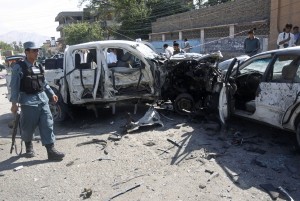Terror once again struck Jalalabad close to the Indian consulate, which has revived raised questions about the safety of India’s diplomatic missions in Afghanistan. The Afghan security forces exchanged fire with gunmen in a house near the consulates of India and Pakistan in the eastern city of Jalalabad on January 13 after a suicide bomber blew himself up. The blast killed three policemen and wounded two, officials said.
Residents in the area claim to have heard a series of explosions; children from a nearby school had been evacuated. The explosions took place 200 meters away from the Indian consulate. Unconfirmed reports said a few attackers are hiding in a house on the same street where Pakistan and Indian consulates are located. All Indians were reported to be safe. This is the third attack on an Indian mission in Afghanistan in the last 10 days.
The latest suicide attacks in Afghanistan comes at a time when efforts are being made by the Afghanistan government to restart peace talks with the Taliban. India and Pakistan are also working towards reducing tensions with each other in the backdrop of the Pathankot terror attacks.
Will Pakistan take action against terror groups?
With India providing leads to Pakistan on the Pathankot attacks, Pakistan has promised to take action against the perpetrators. However, the latest revelations by the Afghanistan police that certain members of the Pakistan military were behind the attack on the Indian consulate in Mazar-e-Sharif on January 3 has once again raised questions about Pakistan’s seriousness and commitment to combat terror.
In a shocking disclosure, the Afghanistan police investigating the attacks on Indian Consulate in Mazar-e-Sharif said that the Pakistan army was behind the consulate attacks.
According to a senior Afghan police official, Pakistani military officers were involved in the attack on the Indian Consulate in Mazar-e-Sharif in which assailants attempted to storm the mission building. “We saw with our own eyes and I can say 99 per cent that those attackers were from Pakistani military and used special tactics while conducting their operation,” Sayed Kamal Sadat, police chief of the Balkh provincem said.
“We are jointly working with the NDS director and have spoken about this –- especially as they came here not able to speak in Dari or Pashtu but speaking in Urdu. It means obviously there is someone who guided those attackers and helped the attackers,” Mr Sadat said.
These revelations cast doubts over the sincerity of Pakistan’s military establishment in probing the Pathankot attacks, and in addressing larger concerns about cross-border terror.
Author Profile
- India Writes Network (www.indiawrites.org) is an emerging think tank and a media-publishing company focused on international affairs & the India Story. Centre for Global India Insights is the research arm of India Writes Network. To subscribe to India and the World, write to editor@indiawrites.org. A venture of TGII Media Private Limited, a leading media, publishing and consultancy company, IWN has carved a niche for balanced and exhaustive reporting and analysis of international affairs. Eminent personalities, politicians, diplomats, authors, strategy gurus and news-makers have contributed to India Writes Network, as also “India and the World,” a magazine focused on global affairs.
Latest entries
 DiplomacyJanuary 5, 2026India walks diplomatic tightrope over US operation in Venezuela
DiplomacyJanuary 5, 2026India walks diplomatic tightrope over US operation in Venezuela India and the WorldNovember 26, 2025G20@20: Africa’s Moment – The Once and Future World Order
India and the WorldNovember 26, 2025G20@20: Africa’s Moment – The Once and Future World Order DiplomacyOctober 4, 2025UNGA Resolution 2758 Must Not Be Distorted, One-China Principle Brooks No Challenge
DiplomacyOctober 4, 2025UNGA Resolution 2758 Must Not Be Distorted, One-China Principle Brooks No Challenge India and the WorldJuly 26, 2025MPs, diplomats laud Operation Sindoor, call for national unity to combat Pakistan-sponsored terror
India and the WorldJuly 26, 2025MPs, diplomats laud Operation Sindoor, call for national unity to combat Pakistan-sponsored terror








